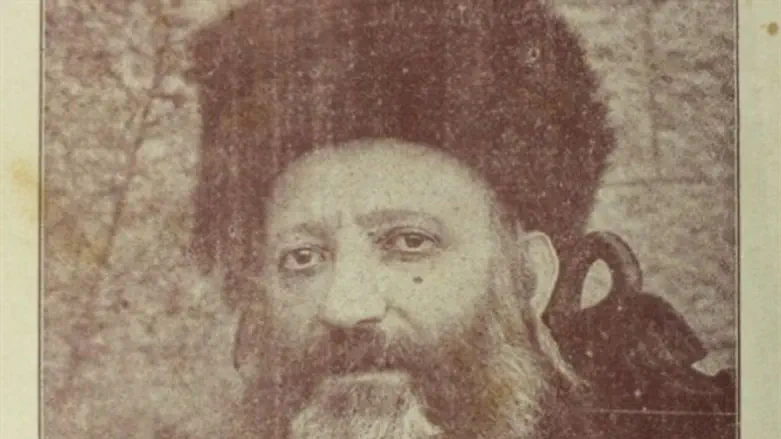
“Appoint judges and police in all of your cities...” (Deut. 16:18)
Rav Kook was overjoyed with the good news: David Tidhar, a Jewish officer serving in the British Mandatory police force, had announced that he was engaged to be married. The rabbi insisted that the wedding be held in his own residence and that he would provide the wedding meal. Rav Kook even invited students from the yeshiva to join in the festivities.
Many people were surprised. Why was Rav Kook so fond of this particular policeman?
Rav Kook explained that David Tidhar had zekhutavot - ancestral merits. His father, Reb Moshe Betzalel Todrosovich, was a wealthy Jaffa philanthropist who had been instrumental in bringing Rav Kook to serve as rabbi of Jaffa. Reb Moshe Betzalel supported numerous religious projects in Jaffa, especially anything related to Jewish education and assisting those in need. This fine man, Rav Kook declared, is certainly deserving of our thanks and gratitude.
The Run-Away Husband

Jewish policemen during the British Mandate (PikiWiki)
But Rav Kook’s appreciation of David Tidhar was also based on his appreciation for the young man’s own character and deeds. Their close ties took on greater importance when Tidhar became an officer in the Jerusalem police force. The Chief Rabbi would often turn to him for assistance in releasing a prisoner or to ameliorate a prisoner’s conditions in jail.
On one unusual occasion, however, Rav Kook requested Tidhar’s help in placing a man under arrest.
A certain resident of Jerusalem had decided to abandon his family, intending on leaving his wife without a proper divorce. Lacking an official bill of divorce (a get), the poor woman would become an agunah, trapped in her marriage and unable to remarry.
The scoundrel intended to flee Jerusalem on the early morning train. Legally, there was no way to stop him. The request to detain him had been submitted to the regional court, but the order could only be approved after the judge arrived at ten o'clock mid-morning.
Hearing of the situation, Rav Kook turned to Tidhar. The resourceful police officer came up with an unconventional solution to deal with the case. He dispatched an undercover detective to the train station. The detective found an excuse to start a fight with the man. The altercation began with harsh words and quickly progressed to fisticuffs.
Policemen instantly appeared and arrested the two brawlers, hauling them into the Me'ah She'arim police station. At that point, Tidhar arrived at the station. He detained the man until Rav Kook sent word that the court order had been obtained. He was then able to officially place the man under arrest.
The Would-Be Expulsion
In another incident, Tidhar sought to prevent the deportation of Jewish immigrants - a deportation that he himself had been detailed to carry out.
The British passport office sent Tidhar a long list of illegal immigrants. The list included many details: names, addresses, ages, and so on. Tidhar was astounded. How had the British obtained so much information about the immigrants?
The answer was not long in coming. British immigration officials had posed as Jewish aid workers, going from house to house in the Jerusalem neighborhoods. Using this ploy, they tricked the immigrants into divulging their identifying details.
As police commander, Tidhar was the officer ordered to expel forty hapless families - on the day before Yom Kippur! It would have been a heart-breaking sight. Tidhar met with the Jewish city council. He requested that the refugees be provided with food and clothing, and he gave them a twelve-hour reprieve before executing the deportation.
The council’s immigration department agreed. They provided for the immigrants’ immediate needs and secretly transferred them to distant neighborhoods, thus forestalling the deportation orders.
In order to assist the refugees, Tidhar needed to work on Yom Kippur. Following Rav Kook’s advice, he dressed as an Arab. This way, the Jewish immigrants would not be disturbed by the sight of a Jew desecrating the holiest day of the year - even if his labors were for their own benefit.
“There are two men,” Rav Kook would say, “who assist me in maintaining order in religious affairs in Jerusalem. The first is the British High Commissioner, Herbert Samuel. And the second is police officer David Tidhar.”
“However, there is a difference between the two,” the rabbi observed. “The commissioner always confers first with his legal advisor, so his assistance is often delayed. Officer Tidhar, on the other hand, is diligent and energetic. He does whatever he promises, quickly overcoming all obstacles.”
David Tidhar admitted, “The British officers thought that they were my commanding officers. But my true commanding officer was Rav Kook. For me, any request of the rabbi was an order, which I tried to discharge to the best of my ability. I considered it a great privilege to fulfill the Chief Rabbi’s wishes.”
(Stories from the Land of Israel. Adapted from HayeiHaRe’iyah, pp. 303-304; Malachim Kivnei Adam, p. 151, sent to Arutz Sheva by Rabbi Chanan Morrison, ravkooktorah.org)
See also: The King's Torah Scroll




